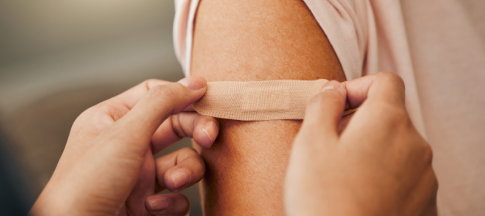
Travelling with a heart condition comes with extra risks – but that shouldn’t stop you from exploring! That’s why it’s important to stay covered with a travel insurance policy.
Stay confident on your trip with our guide to travelling after a coronary angioplasty.
Do I need travel insurance after a coronary angioplasty?
Travel insurance will cover you for some medical costs if you get ill on your trip.
If you need treatment while you’re abroad, a travel insurance policy that covers your heart condition will help you avoid unexpected medical bills.
People with pre-existing medical conditions are more likely to get ill while they’re abroad. So it’s important to find the right policy for you and understand the different cover limits and exclusions.
Can I get travel insurance after a coronary angioplasty?
Yes. Anyone with a pre-existing heart condition or who has had heart-related surgery, like a coronary angioplasty, should be able to get travel insurance.
Every insurer has their own rules around what they cover, so you should always check the policy covers your specific condition or situation.
It’s important to make sure:
- you’re cleared to travel by a medical professional before you leave
- you declare all your pre-existing medical conditions to your insurer
What does travel insurance cover for people after a coronary angioplasty?
A travel insurance policy should cover:
- emergency medical costs
- bringing you back to the UK if it’s medically necessary
- lost, stolen or damaged medication
- costs if you need to cancel or cut your trip short because of your heart condition
Does my coronary angioplasty count as a pre-existing medical condition?
Yes. We define a pre-existing medical condition as an illness or injury that:
- has been identified by a medical professional
- is under investigation by a medical professional
- existed within five years of booking your trip or your travel policy starting (whichever is later)
Should I declare my coronary angioplasty to my travel insurer?
Yes. You need to tell your insurer about the heart condition that needed treatment with a stent. They’ll ask you about this during the screening process.
Your insurer can then make sure your policy covers any potential problems relating to your heart condition or stent – so you can avoid unexpected medical bills.
If you don’t tell your insurer and then need to claim for medical costs, they might not cover them – even if your claim isn’t related to your heart condition.
What will my insurer ask during the screening process?
If you quote with us, we’ll ask you about:
- the medication you take for your heart condition
- whether you’ve recently been to hospital because of your condition
- if you have any related health conditions
For travellers with heart conditions, or who have had coronary angioplasty surgery, we might also ask you about:
- where in your body your stent was fitted
- if you’ve ever had a heart bypass
- if you’ve ever been a smoker
- when your angioplasty surgery was performed, or when your stent was fitted
- if you’ve had any chest pains or chest tightness since your last procedure
- how many coronary stents you have
Everything you tell us is between us – it's just to make sure we can give you the right cover.
How much is travel insurance after a heart attack or coronary angioplasty surgery?
If you have a heart condition, the cost of your travel insurance might be more expensive.
We work out the cost of your policy based on your condition and any other health problems you might have.
The price of your policy will always depend on:
- where you’re going
- how long you’re going for
- what activities you have planned
- if you have any other health conditions
- the nature of your pre-existing condition
How should I prepare when travelling after a heart attack or coronary angioplasty?
Here are a few key things to think about before you jet off:
Chat to a medical professional
It’s good to have a check-up with a medical professional to make sure you’re fit to fly.
Choose your destination carefully
Avoid any locations that could worsen your heart condition’s symptoms – like very hot, very cold, or high-altitude places.
Research your destination’s drug laws
Check with a medical professional that your medication is a legal substance in the country you’re travelling to.
Manage your medication
Pack medication in both your cabin and hand luggage in case anything gets lost, stolen or damaged.
Make sure you take enough with you to last the whole of your trip. Plus, a few days extra just to be on the safe side.
Carry your medication paperwork
If you’re travelling with a heart condition or stent, you should pack:
- a valid Global Health Insurance Card (GHIC) – this lets you access medical care and get treatment while you’re travelling in Europe. Read our guide on using the GHIC.
- a Device ID Card if you have a heart device fitted, like a pacemaker.
- any recent medical letters, records of treatment you’ve had, and a copy of your electrocardiogram (ECG).
Contact your airline about your condition
It’s important to let security staff at the airport know if you have a heart device. The scanners shouldn’t affect your device if you walk through them, but airport staff will need to be careful when scanning you with a handheld metal detector.
Stay safe in the air
Your heart condition might also mean that you’re at a higher risk of developing deep vein thrombosis (DVT) while you fly, so be sure to wear compression socks and move around regularly.
Can I fly after having a heart attack or a stent fitted?
Yes. But it’s recommended that you:
- wait until a medical professional says it’s safe to travel
- book a check-up with your GP
- tell your insurer about your condition and your approval from a medical professional
How soon can I fly after having a stent fitted?
After coronary angioplasty surgery, you should be safe to fly two weeks after a successful procedure. If you experienced any complications during or after the surgery, you might have to wait longer.
Book a check-up with a medical professional before you travel so they can check it’s safe.
What should I do if I get ill while abroad?
If it’s urgent, call the emergency services or go to the nearest hospital.
Call your insurer’s emergency helpline as soon as possible. If you’re with us, our 24-hour helpline is +44 (0) 292 010 7777.
You should call us before going into hospital or if your medical costs are likely to be over £500, so we can help you.
Read our guide on what to do if you get ill abroad for more advice.
MoneyHelper Directory
If we can’t cover your medical condition, you can use the MoneyHelper directory to find a specialist insurer who might be able to cover you if you’ve been:
- Refused travel insurance or had your policy cancelled
- Offered cover with a medical exclusion that you can’t remove from your policy
- Quoted a price for a travel insurance policy with high medical costs
MoneyHelper makes it easier to find and compare policies you can afford that cover your condition and medical needs. Access the MoneyHelper directory online or call MoneyHelper on 0800 138 7777 (phone lines are open Monday to Friday, 8:00am to 6:00pm, excluding bank holidays).


